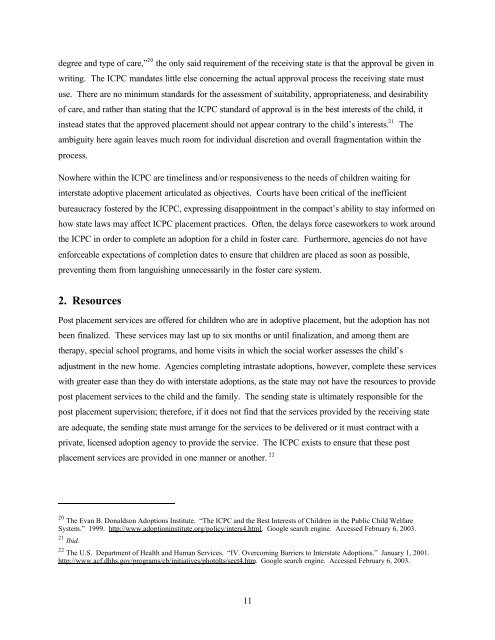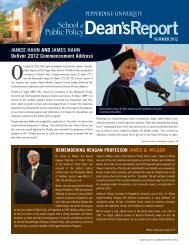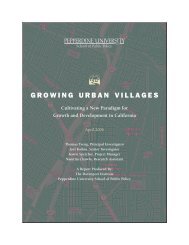Finding Permanent Homes for Adoptable Children - Pepperdine ...
Finding Permanent Homes for Adoptable Children - Pepperdine ...
Finding Permanent Homes for Adoptable Children - Pepperdine ...
Create successful ePaper yourself
Turn your PDF publications into a flip-book with our unique Google optimized e-Paper software.
degree and type of care,” 20 the only said requirement of the receiving state is that the approval be given in<br />
writing. The ICPC mandates little else concerning the actual approval process the receiving state must<br />
use. There are no minimum standards <strong>for</strong> the assessment of suitability, appropriateness, and desirability<br />
of care, and rather than stating that the ICPC standard of approval is in the best interests of the child, it<br />
instead states that the approved placement should not appear contrary to the child’s interests. 21 The<br />
ambiguity here again leaves much room <strong>for</strong> individual discretion and overall fragmentation within the<br />
process.<br />
Nowhere within the ICPC are timeliness and/or responsiveness to the needs of children waiting <strong>for</strong><br />
interstate adoptive placement articulated as objectives. Courts have been critical of the inefficient<br />
bureaucracy fostered by the ICPC, expressing disappointment in the compact’s ability to stay in<strong>for</strong>med on<br />
how state laws may affect ICPC placement practices. Often, the delays <strong>for</strong>ce caseworkers to work around<br />
the ICPC in order to complete an adoption <strong>for</strong> a child in foster care. Furthermore, agencies do not have<br />
en<strong>for</strong>ceable expectations of completion dates to ensure that children are placed as soon as possible,<br />
preventing them from languishing unnecessarily in the foster care system.<br />
2. Resources<br />
Post placement services are offered <strong>for</strong> children who are in adoptive placement, but the adoption has not<br />
been finalized. These services may last up to six months or until finalization, and among them are<br />
therapy, special school programs, and home visits in which the social worker assesses the child’s<br />
adjustment in the new home. Agencies completing intrastate adoptions, however, complete these services<br />
with greater ease than they do with interstate adoptions, as the state may not have the resources to provide<br />
post placement services to the child and the family. The sending state is ultimately responsible <strong>for</strong> the<br />
post placement supervision; there<strong>for</strong>e, if it does not find that the services provided by the receiving state<br />
are adequate, the sending state must arrange <strong>for</strong> the services to be delivered or it must contract with a<br />
private, licensed adoption agency to provide the service. The ICPC exists to ensure that these post<br />
placement services are provided in one manner or another. 22<br />
20 The Evan B. Donaldson Adoptions Institute. “The ICPC and the Best Interests of <strong>Children</strong> in the Public Child Welfare<br />
System.” 1999. http://www.adoptioninstitute.org/policy/inters4.html. Google search engine. Accessed February 6, 2003.<br />
21 Ibid.<br />
22 The U.S. Department of Health and Human Services. “IV. Overcoming Barriers to Interstate Adoptions.” January 1, 2001.<br />
http://www.acf.dhhs.gov/programs/cb/initiatives/photolts/sect4.htm. Google search engine. Accessed February 6, 2003.<br />
11












